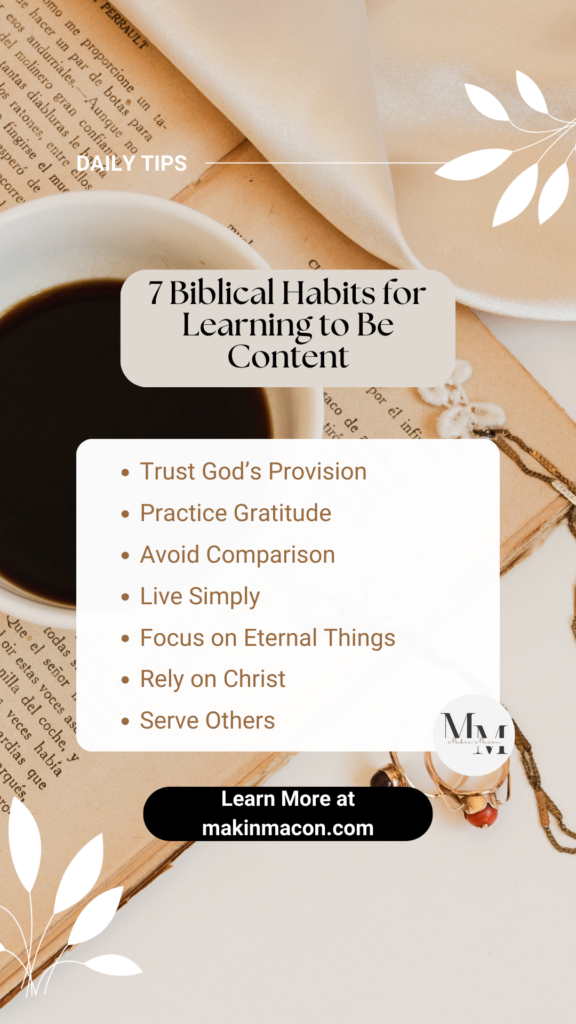How to Be Content in Every Season: 10 Biblical Steps to Learn Peace

Have you ever stopped to ask: What does contentment really mean? According to Webster’s Dictionary, it’s “the quality or state of being contented,” or a feeling of quiet happiness and satisfaction. Synonyms include satisfaction, peace, and ease. But here’s something interesting: content as a verb means “to make content; to satisfy.” That means contentment isn’t just a feeling—it’s an action. It’s something we learn to do.
And that’s exactly what Scripture teaches us: to be content is not natural—it’s a learned virtue. It’s not something we’re born with, and it’s not something God simply hands us. Contentment is something He teaches us through His Word, through our experiences, and often through trials.
What Scripture Says About Contentment

Paul’s words in Philippians 4:11-12 remind us that contentment is something we learn through experience. The Greek word he uses for content—autarkes—originally means self-sufficient. But Paul redefines it through the lens of Christ: his sufficiency is not in himself but in his Savior.
"Not that I speak in respect of want: for I have learned, in whatsoever state I am, therewith to be content... I can do all things through Christ which strengtheneth me." – Philippians 4:11-13 (KJV)
Paul wasn’t writing this from a beach house—he was in prison. His contentment wasn’t based on good circumstances; it was rooted in Christ. This truth aligns with 1 Timothy 6:6, which says, “But godliness with contentment is great gain.” And Hebrews 13:5 reminds us to be content with what we have because God has said, “I will never leave thee, nor forsake thee.”
Learning to Be Content Is Not Easy—But It’s Worth It
Let’s be honest: contentment isn’t always easy. Especially when you’re dealing with unanswered prayers, real needs, or painful seasons. But here’s the truth that we often don’t want to face—sometimes we are the cause of our own discontentment. It’s not always the circumstances God places us in—it’s how we respond, what we chase, and what we think we deserve.
We mix up needs and wants. God promises to supply all our needs, but we often expect Him to fulfill our wants. That difference can lead to frustration and false expectations.
Contentment is a virtue that must be learned—and God uses life’s difficulties as the classroom. Paul didn’t start his ministry with a peaceful heart in every trial. He learned it through shipwrecks, prison, and hunger. Just like us, he had to walk with God to develop that trust.
“When you have clung to Jesus through pain and problems and experienced His amazing grace, you find joy in Him.” – Jo Ann Levell
The Israelites serve as a cautionary tale. In Joshua 5:6, we’re told that those who murmured and complained in the wilderness were not allowed to enter the Promised Land. They had what they needed, but they let their wants cloud their gratitude.
Let our dissatisfaction become a signal—not to complain—but to ask: What is God trying to teach me here? Is He revealing areas where I need to grow, trust, or let go?
Psalm 37:4-5 gives us a powerful roadmap:
"Delight thyself also in the Lord: and he shall give thee the desires of thine heart. Commit thy way unto the Lord; trust also in him; and he shall bring it to pass." (KJV)
Notice the order: Commit, trust, then delight. Don’t expect God to do something if you aren’t willing to take action. When we commit our way to Him and truly trust His plan, only then do our desires begin to align with His will.
10 Biblical Steps to Learn to Be Content
Here are ten practical, Bible-based ways you can begin learning contentment in your life today:
- Trust God’s Provision – Philippians 4:19
Believe that God provides what you need (not want—don’t confuse them). Contentment grows when you trust that He knows what is best for you. - Practice Gratitude Daily – 1 Thessalonians 5:18
Keep a gratitude journal and write down daily blessings. Thank God in prayer for what you have instead of focusing on what you lack. - Avoid Comparison – 2 Corinthians 10:12
Social media and culture encourage comparison, but contentment comes from embracing your God-given life. Focus on your own journey instead of envying others. - Learn to Live Simply – 1 Timothy 6:6-8
Evaluate your lifestyle: Are you choosing material things for satisfaction? Simplify your life by prioritizing what truly matters—faith, family, and purpose. - Shift Your Focus to Eternal Things – Colossians 3:2
The world tells us we need more, but Jesus teaches us to desire the eternal. Invest your heart in God’s Kingdom rather than temporary things. - Rely on Christ’s Strength – Philippians 4:11-13
True peace is not dependent on circumstances but on Christ. Pray for His strength to help you remain content in every season. - Be Generous and Serve Others – Acts 20:35
Giving shifts your focus from what you lack to how you can bless others. Find joy in serving and helping others, which brings a deep sense of fulfillment. - Develop a Heart of Worship – Psalm 16:11
Worship keeps your heart centered on God and reminds you that He is enough. Make worship a part of your daily life—through song, prayer, or reading His Word. - Surrender Your Desires to God – Psalm 37:4
Contentment doesn’t mean never wanting anything, but it does mean trusting God with your desires. Pray and surrender your dreams to God, trusting His timing and will. - Surround Yourself with Godly Influences – Proverbs 13:20
Spend time with people who encourage peace and faith. Limit exposure to influences that stir discontent, such as materialistic or negative environments. Go to church! Find joy in fellowship with others.
📥 Want to keep these steps handy? Click here to download the free printable checklist.

I’m Still Learning Too
There are so many things I could list right now that make me feel discontent. Some are material, some physical, and some even spiritual. But when I really pause and examine my life—not through rose-colored glasses, but with honest reflection—I see just how blessed I truly am.
My house might not look like it belongs on Pinterest, but it’s safe and warm. My car might not be fancy, but it’s paid for and gets me where I need to go. I may not have the health I wish for, but those struggles have allowed me to share my story and help others. (Read more in my blog post: The Pain of Unanswered Prayers.)
And I’ll be honest—some of my discontentment is my own doing. I’ve made choices that led me to places of stress or frustration. But even then, God is kind. He teaches me. He reminds me that He is enough.
I’m still learning to be content. Still learning to trust. Still learning to let go of what I think I need and embrace what He’s already provided.
Want to explore this more? Check out these related posts:
- Trusting God in Difficult Times: How to Have Faith Over Fear
- Keeping Up with the Jones
- The Paralysis of Faith: How to Trust God in the Waiting
- Mid-Week Encouragement Series
Let’s remember what Paul knew from experience: contentment is not given—it’s learned. And the best teacher is Christ.
Want to keep growing in faith, even when life feels messy?
My 10-day devotional, Kneading Faith, is written just for Christian homemakers who are doing it all. Each day blends Scripture, encouragement, and relatable stories (plus a sprinkle of humor and homemaking!) to help you rise spiritually—right where you are.
Whether you’re in the kitchen, cleaning up Legos, or just needing five minutes of peace, this devotional will help you reconnect with the One who holds it all together.
👉 Click here to check it out and start your journey today!
Stay Rooted When Life Feels Chaotic
Because you weren’t meant to do it all alone
In the middle of marriage, motherhood, ministry, and everything else on your plate, Stay Rooted offers a breath of encouragement when you need it most. These occasional emails are full of faith-filled reminders, relatable stories, and a little humor to keep you grounded in what matters most—even when life feels anything but calm.
Youtube
Remember, I’m always praying for you, even if I don’t know who you are!






